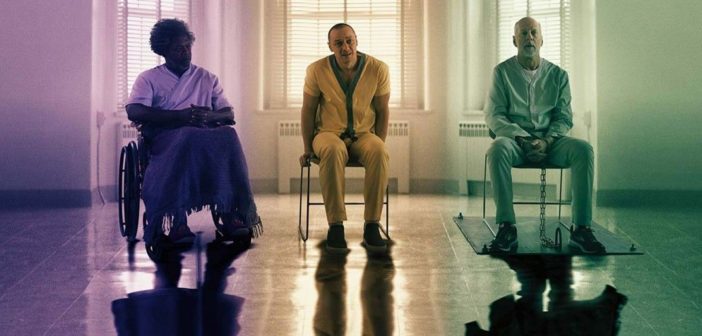By: Nicholas Fox
“Glass” is the third film in the series created by legendary director M. Night Shyamalan. The film wraps up a storyline 19-years in the making from its initial movie “Unbreakable” (2000) that starred Bruce Willis as the protagonist David Dunn.
The events of the film were reawakened in 2017 as the movie “Split” starring James McAvoy as The Beast/The Hord ended on a cliffhanger recalling the events of “Unbreakable” and mentioning the protagonist Mr. Glass (Samuel L. Jackson).
The film does an excellent job at introducing audiences to each character and seamlessly creates a plot for three films that each can each stand alone. The motivations of each of the movies’ primary characters are seen through a wide lens for the viewers to have time to perceive what drives them.

The cinematography showed a lot of contrast between the characters in the film “Glass.” This created tension and was used as an effective tool in moving the film forward. @deepakmohanty
James McAvoy steals the screen with every minute viewers see him. He has multiple personalities to portray with a few additional ones that surface. It is amazing to see McAvoy exchange personalities as his motion is fluid, and he continues to show the depth of his character.
Dr. Ellie Staple (Sarah Paulson) acts as a curator of sorts in trying to deal with the characters in an asylum, prodding them that their abilities are no more than manifestations of their conscious beliefs. Her motivations and the surprises she lends to the screen gives chills as she displays her talent as an actress.
Surprisingly, Samuel L. Jackson adds a dynamic we have not seen in him for a while as he transitions from a near catatonic state to a mouthpiece of a mastermind. Willis, who has continued to show his acting range over the years, is more stoic and does not get the amount of screen time necessary for such a great actor to shine, which leads into the downside of the movie.
From the outside perspective, the movie shows us the characters and their motivations but introduces a subplot that extends throughout the run-time of the film that weighs down the plot heavily. This frustrates the viewers more than anything else as Bruce Willis’ conflict with the other two characters was what was anticipated the most.

@stacey_laney James McAvoy continued his stellar performance as The Hord/The Beast scrolling through nearly 30 personalities.
Towards the middle of the film, the plot lets viewers go as the writers tend to push the agenda of the subplot. It creates a moment in the film that is so disjointed that some viewers have reported falling asleep, waking back up and realizing that they hadn’t missed anything.
The movie feels as if it could be three separate films, which is possibly what the director wanted the audience to experience through the eyes of each character. Creative as the attempt was, it falls short; they delivered a movie that was a bloated husk.
Notwithstanding this flaw, these moments of the film create tension. The conflict is beautifully done, and the characters are portrayed well. Direction and cinematography seem to compliment the well-shot scenes in the beginning and the end of the film. However, the middle is inexcusable and lets audiences down–the impact of which is causing the film to suffer as word of mouth spreads.
Most of the reactions that came from the film’s reception have equated it as a general let-down from Shyamalan, who has helmed a few projects in the past that have had similar effects like “After Earth” and “The Last Airbender.”
Despite having so many difficulties, “Glass” maintains an audience score of 76 percent on the movie aggregate website Rotten Tomatoes and a meager 36 percent critic score and holds the box office No. 1 spot as of January 28, 2019. The site claims the consensus of the critics by saying, “Glass displays a few glimmers of M. Night Shyamalan at his twisty world-building best, but ultimately disappoints as the conclusion to the writer and director’s long-gestating trilogy.” This appears to be a fair summation of the records as “Glass,” presents itself as a huge blockbuster with too many small issues.





